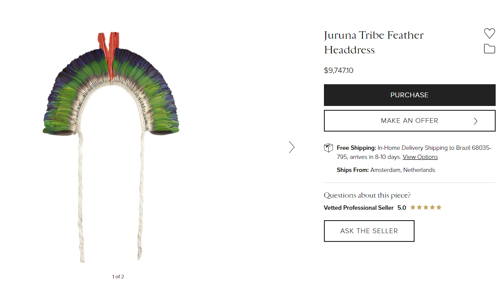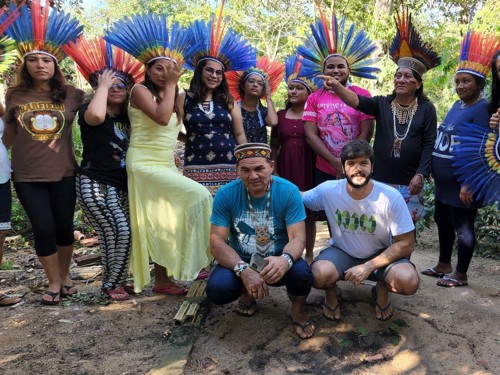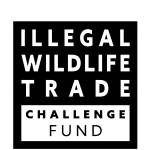Protecting birds and Indigenous featherwork

Indigenous people taking part in craft workshops. Credit - RENCTAS.
Protecting birds by combating the illegal trade in Indigenous featherwork in Brazil
The Indigenous peoples of Brazil have rich and diverse traditions, with featherwork being one of their foremost expressions. Headdresses, pectorals, tiaras, earrings, and ritualistic objects are made from various parts of wild animals, and the main raw material used is feathers. All these objects have an important meaning for Indigenous people: they can indicate a social position within a community or even be used in shamanic rituals to treat diseases.
Ever since Brazil was ‘discovered’ in the 1500s, the handicrafts of the native peoples became, due to their aesthetic beauty, an important trading tool for the Indigenous people, who exchanged them for objects brought by the colonisers. Since then, the featherwork produced in Brazil has attracted the attention of art collectors and even decorators who like to enrich house interiors with these artifacts.
"Artificial feathers have been developed, becoming an abundant and sustainable raw material for Indigenous people to continue producing their ancestral handicrafts."
Since that time, Brazil's Indigenous people have always been the victims of those who saw featherwork only as an opportunity for easy profit. In many villages today, the trade in featherwork is still a way of earning a family income, but it is almost always an extremely damaging activity for the environment and for wild birds. Illegal dealers visit these villages and buy these artifacts for extremely low prices, forcing the Indigenous people to produce ever larger quantities to make a living.
Headdresses bought in the villages for US $10 are sold in decoration stores in the big cities for up to $2,000. Abroad, these same headdresses can fetch an impressive $75,000 at auction houses specialising in Indigenous art. This trade leaves behind a trail of social exploitation, predatory hunting, and the threat of extinction for thousands of animals such as parrots, macaws, and dozens of other bird species.

Depending on the size, a single headdress can cost the lives of up to 40 macaws to make, as in some cases only the tail feathers and a few wing feathers are used to make a handcrafted item. Often, these objects also receive pieces of other wild animals, such as jaguar skins or snake fangs.
Brazilian legislation guarantees the use of these cultural objects by traditional peoples, but prohibits their sale to non-Indigenous people. This means that the sale of any Indigenous handicraft that uses animal parts is of illegal origin.
To conserve wild species while supporting the traditional knowledge of Indigenous peoples, RENCTAS, with the support of the UK’s IWT Challenge Fund, developed the project ‘Tradition with Conservation.’ This pioneering initiative is being implemented with the participation of Indigenous leaders in several villages along the Tapajos River in the Brazilian Amazon.
With the help of experienced artisans, artificial feathers identical to natural feathers have been developed, becoming an abundant and sustainable raw material for Indigenous people to continue producing their ancestral handicrafts and, at the same time, generate permanent income for their communities.

In addition to developing and supplying the raw material, RENCTAS also organises courses taught by Indigenous artisans. The courses are aimed at teaching young Indigenous people, mainly women, how to craft the featherwork of their ethnic groups. RENCTAS is also drawing up a business plan to market the pieces produced via the internet, which will all be certified. All profits will go to the artisans and the maintenance and expansion of the project.
In this way, the project has great potential to be replicated in hundreds of Indigenous communities in Brazil and even abroad, promoting justice and social inclusion, the elimination of animal traffickers and, above all, helping to bring several species of Brazilian wildlife out of extinction.
Written by Thiago P. Vargas da Costa, the Brazilian Network to Fight the Trafficking of Wild Animals (RENCTAS). For more information on this IWT Challenge Fund Main project IWT120, led by RENCTAS, please click here.

 Back
Back